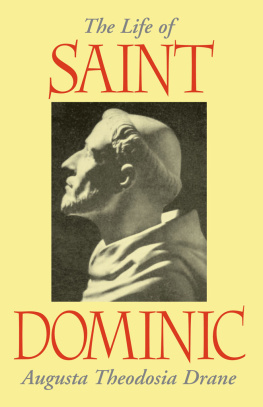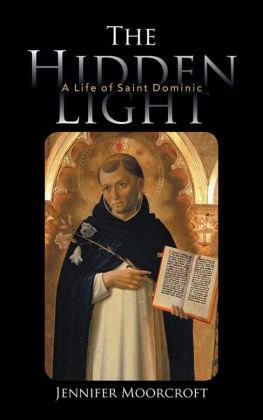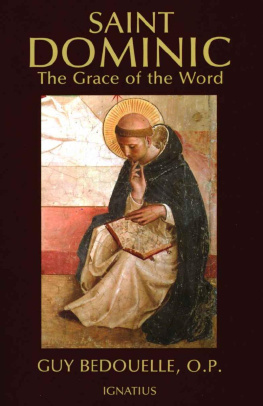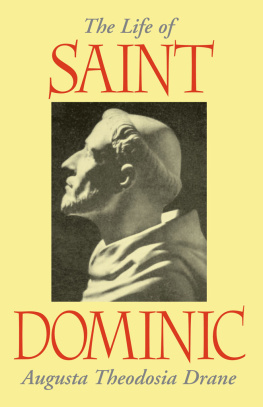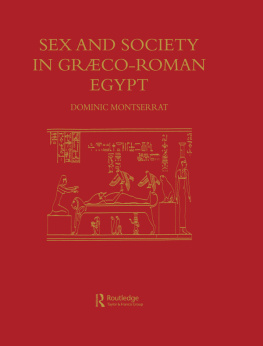Drane - The Life of St. Dominic
Here you can read online Drane - The Life of St. Dominic full text of the book (entire story) in english for free. Download pdf and epub, get meaning, cover and reviews about this ebook. year: 1891, publisher: TAN Books, genre: Non-fiction / History. Description of the work, (preface) as well as reviews are available. Best literature library LitArk.com created for fans of good reading and offers a wide selection of genres:
Romance novel
Science fiction
Adventure
Detective
Science
History
Home and family
Prose
Art
Politics
Computer
Non-fiction
Religion
Business
Children
Humor
Choose a favorite category and find really read worthwhile books. Enjoy immersion in the world of imagination, feel the emotions of the characters or learn something new for yourself, make an fascinating discovery.
- Book:The Life of St. Dominic
- Author:
- Publisher:TAN Books
- Genre:
- Year:1891
- Rating:5 / 5
- Favourites:Add to favourites
- Your mark:
- 100
- 1
- 2
- 3
- 4
- 5
The Life of St. Dominic: summary, description and annotation
We offer to read an annotation, description, summary or preface (depends on what the author of the book "The Life of St. Dominic" wrote himself). If you haven't found the necessary information about the book — write in the comments, we will try to find it.
The Life of St. Dominic — read online for free the complete book (whole text) full work
Below is the text of the book, divided by pages. System saving the place of the last page read, allows you to conveniently read the book "The Life of St. Dominic" online for free, without having to search again every time where you left off. Put a bookmark, and you can go to the page where you finished reading at any time.
Font size:
Interval:
Bookmark:
The Life of St. Dominic
Augusta Theodosia Drane
The Life of St. Dominic by Augusta Theodosia Drane (1823-1894) was first published in 1857 in London. The present edition is retypeset from the first part of a two-part work entitled The Life of St. Dominic, with a Sketch of the Dominican Order published by Burns, Oates & Washbourne Ltd., London, c. 1890.
Retypeset and published in 1988 by TAN Books.
Library of Congress Catalog Card No.: 88-50268
ISBN: 978-0-89555-336-2
The typesetting in this book is the property of TAN Books, and may not be reproduced, in whole or in part, without written permission of the publisher.
TAN Books
Charlotte, North Carolina
www.TANBooks.com
2011

The trial by fire: the writings of the Albigenses are consumed in the flames, while St. Dominics book on the Flesh of Christ is miraculously borne safely away in the presence of the whole assembly. (See pages 18 and 236). In this book St. Dominic affirmed the Immaculate Conception of the Blessed Virgin Mary.
And how shall they hear, without a preacher? And how shall they preach unless they be sent, as it is written: How beautiful are the feet of them that preach the gospel of peace, of them that bring glad tidings of good things!...Yes, verily, their sound hath gone forth into all the earth, and their words unto the ends of the whole world.
Romans 10:14-15, 18
CONTENTS
.
.
.
.
.
.
.
.
.
.
.
.
.
.
.
.
.
.
.
.
.
.
.
.
.
.
PREFACE
A few words of explanation may seem required as an apology for presenting the public with a new biography of St. Dominic. The beautiful life of the Saint by Pre Lacordaire seemed to have furnished everything that could be desired in clothing the legendary story of his great patriarch in a modern dress. But although there can certainly be no temptation to pretend to anything like a rivalry with that eloquent writer, there are some reasons which appear to make a fresh biography desirable for those among ourselves who wish to form a more familiar acquaintance with St. Dominic than is furnished in the brief notices given in English collections of the lives of the Saints. It is true Pre Lacordaires life has for some time been translated into our own language; but the very beauty of its style is so essentially French that no translation can preserve its peculiar charm, or render it as popular as it deserves to be. But it is French in something more than idiom: It was written with the avowed object of advancing the Order in France, and a prominence is therefore given to the Gallican associations of the Order of Preachers which, by readers of another nation, is felt to be undue.
In the following pages, the course of the Saints life has been followed with no view save that of giving his character in its true historical light; and for this end, the simple narrative of facts, without comment or explanation, has been felt to be sufficient. We are much mistaken if the best defense that can be offered of St. Dominics character, so long the subject of the strangest misrepresentation, be not to be found in the unvarnished story of his life, drawn from the testimony of those who saw him face to face, and whose writings form the principal material from which the following pages have been compiled.
There are some subjects which our readers may be disappointed in finding so briefly touched upon in a life of St. Dominic. But we have felt that several of the disputed points, commonly discussed by his biographers, have little real interest to the student of his character. We have not, therefore, entered at length into the history of the Albigensian war, or of the foundation of the Inquisition, preferring to leave the doubts arising out of these subjects to be resolved by others whose object is the critical examination of historical questions. Our only task has been to lay before our readers the personal portrait of one whose influence in the Church of Christ must endure so long as the religious and apostolic life shall be found within her bosom.
The authorities from which we have drawn our sketch have been chiefly Mamachis Annals, with the ancient chronicles and memoirs reprinted in that work, including the Acts of Bologna, the memoir of Sister Cecilia, and that of blessed Humbert; Polidoris life, which follows the facts, and in many places the text, of Blessed Jordan; Ferdinand Castiglios history of the Order, and the life of St. Dominic by Touron; whilst in the account of the early Fathers of the Order, great use has been made of F. Michel Pios work entitled Progenie dell Ordine in Italia (which collects all the particulars given by Gerard de Frachet and the old writers), and of the biographical sketches of F. Marchese in his Diario Domenicano.
The summary of the history of the Friars Preachers subsequent to the death of St. Dominic has been chiefly taken from Tourons great work on The Illustrious Men of the Order. In selecting a few out of the many names that called for notice, we have necessarily omitted a number that will readily suggest themselves to our readers; but our object has been to avoid wearying them with a mere enumeration of authors and learned works, and, without attempting such a complete sketch as our limited space rendered impossible, to suggest something of the general features of the Order as illustrated by the lives of its greatest men.
 CHAPTER 1
CHAPTER 1
The birth of Dominic. His youth and university life.
It was in the year 1170, during the pontificate of Alexander III, that Dominic Guzman, the founder of the order of Friars Preachers, was born at his fathers castle of Calaroga, in old Castile. The history of a genealogy, however illustrious, seems scarcely to find its place in the biography of a saint; though indeed few families can boast of one more honorable than that of the Castilian Guzmans. But if their long line of chivalrous ancestors, and the royal privileges granted to them by the kings of Spain, have no claim to be noticed here, the immediate ancestors of St. Dominic possessed at least one distinction which had a more powerful influence on his life. They were a family of saints.
The household of his father, Don Felix Guzman, was so remarkable for the religious character of its inmates that it was said to resemble rather a monastery than a knightly castle. His mother, Joanna of Aza, after being constantly held in popular veneration, has, almost within our own time, received the solemn beatification of the Church. The same testimony has been borne to the heroic sanctity of Manez, her second son; and though Antonio, the eldest of the three brothers, has not indeed received similar honors, yet was he no unworthy member of his illustrious family. We read of him that he became a secular priest, in which position he might have aspired to the highest ecclesiastical distinctions; but, enamored of holy poverty, he distributed his patrimony to the poor and retired to a hospital where he spent the remainder of his days in humbly ministering to the sick.
The future greatness of her younger son was announced to Joanna even before his birth. The mysterious vision of a dog, bearing in his mouth a lighted torch which set fire to the world, appeared to indicate the power of that doctrine which should kindle and illuminate mens hearts through the ministry of his words. The noble lady who held him at the font saw, as the water was poured on his head, a brilliant star shining on the infants forehead; and this circumstance, which is mentioned in the earliest life which we have of the saint (that of Blessed Jordan), bears a singular connection with the beautiful description of his appearance in after-life, left by his spiritual daughter, the Blessed Cecilia; in which she says, among other things, that from his forehead, and between his brows, there shone forth a kind of radiant light, which filled men with respect and love.
Next pageFont size:
Interval:
Bookmark:
Similar books «The Life of St. Dominic»
Look at similar books to The Life of St. Dominic. We have selected literature similar in name and meaning in the hope of providing readers with more options to find new, interesting, not yet read works.
Discussion, reviews of the book The Life of St. Dominic and just readers' own opinions. Leave your comments, write what you think about the work, its meaning or the main characters. Specify what exactly you liked and what you didn't like, and why you think so.

